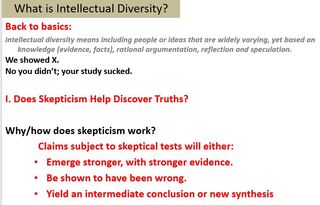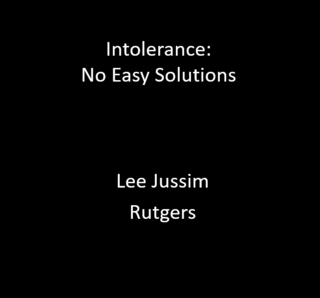Psychology
My Newest Diversity, Equity, and Inclusion Statement
"This should be a safe space for truth-telling."
Posted September 20, 2020
This is my third Diversity, Equity and Inclusion Statement. You can find my first (possibly the first in Rutgers Psychology here). You can find my second here ("I am afraid, not of actual social justice, but of what some people are willing to do, and are in fact now doing, in the name of social justice.") Admittedly, that one was mostly a rhetorical device to warn of a virulently authoritarian strain of social justice. Of course, that’s fair, too; “diversity, equity, and inclusion” by any reasonable standard would seem to require the exact opposite of authoritarian intolerance.

This one is from a course I am currently teaching, slightly modified for this blog. I thank Professor Geoffrey Miller, who provided some of the ideas I included here, and Dr. Joel Finkelstein, who heads the non-partisan Network Contagion Research Institute studying political extremism, and who opens every meeting with some of these ideas.
Diversity, Equity, and Inclusion Statement
Everyone here should be focused on determining truths in a civil way that relies on facts and data. Speculation and moral claims are acceptable, but I will push you to recognize and acknowledge the difference between speculation, morality, facts, and evidence. Sectarian/narrow political views are allowed, even welcome, so we can make use of conflict in ways that help us all, but we have to prioritize truth-telling above more narrow interests ultimately. Demonization or bullying for people’s opinions, beliefs, politics, values, or culture is not acceptable. This has to be a space that is safe for truth-telling for everyone. Goal: to convene discussions around issues of polarization, extremism, and real-world cases of the rise and manifestations of left- and right-wing authoritarian movements.

One goal is to support and strengthen articulate expression of diversity of opinion, and to do our part to encourage respect for each other’s freedom of speech, inquiry, and conscience. I will try to make this class a truly inclusive and mutually respectful place, in terms of demographics, sexuality, religion, politics, or any belief, background, or experience you bring to it. You are welcome whether you come from an affluent, working-class, or poor background; whether you come from a long line of professionals and intellectuals, or if, like me, you are the first person from your family to complete college. You are welcome whether you are or have been a veteran, athlete, police officer, or political activist. You are welcome if you have a disability or mental health issue. You are welcome whatever your life circumstances and challenges may be. You are welcome regardless of your racial, ethnic, or cultural background. You are welcome regardless of your political orientation or identity.
If you have some unique situation that requires adapting the course in some way to permit you to be fully included, please let me know; I will do everything I can to do so.
With a highly contentious presidential election coming up, it is especially important to be politically inclusive and to be respectful of anyone who does not share your views. Denunciation and personal attacks will have no place in this class.
Some of your fellow students might have views that you consider offensive, abhorrent, sinful, ridiculous, idiotic, psychopathic, dangerous, or evil – and some might think your views fit into these categories. In this class, we will be treating each other the way we would want to be treated – with politeness, respect, and civility.

Except in cases where facts are known with certainty (e.g., shape of the Earth, speed of light, origin of species), this course will embrace not merely “bothsidesism” (giving time for expression of opposing views) but “manysidesism” (many issues are sufficiently complex that understanding them, and the solutions for their associated social problems, lend themselves to serious consideration from many angles and many different perspectives).
Expect to have some of your views, and even your values, challenged, including deeply held ones. In this course, no claims about the empirical state of the world – including those based on your own experiences – are sacrosanct. Social psychology, despite its many flaws, has (along with some help from cognitive psychology) clearly and repeatedly demonstrated that we humans are subject to many biases, including but not restricted to self-serving biases, overconfidence, base-rate fallacy, representativeness, conjunction fallacy, implicit biases, social desirability biases, moral grandstanding, difficulty accessing or own cognitive processes, tribalism, ingroup biases, virtue signaling, and bullsh*tting (I refer to this in the academic sense, there is a whole literature on this). Therefore, even things you hold to be dearly true, including your memory and interpretations of your own experiences, are not, in this class, beyond question.
A common development over the last few years has been for people to be condemned, denounced, and ostracized for minor missteps, awkward phrases, use of out-of-favor terminology, and alleged dogwhistles. People are often unaware of how much their ideology and worldview colors their thinking about everything from racism to causality, and this can result in a “my way or the highway” attitude toward conflict and righteous offense-taking at alleged missteps. This attitude will not be accepted in this class. In fact, this class will critically interrogate historical and modern developments reflecting these phenomena, including Maoist struggle sessions and modern cancel culture.

It is a matter of respect to refer to people how they would like to be referred to. If this comes up in the class, please respect people’s identity preferences. Regardless, denunciation and ostracism is far more corrosive to a productive and cooperative discussion, and, indeed, to a functioning academic environment and even to liberal democracy itself, than are minor missteps.
Trigger Warnings
You might not want to take this class if:
- you find yourself offended by “bothsidesism.”
- you find yourself offended by approaching difficult issues through evidence, logic, and reasoned discussion and discourse more than feelings.
- you become readily offended or outraged by ideas or perspectives quite different than yours.
This might not be the course for you if you have enthusiastically participated in:
- cancel culture
- public denunciations
- Twitter or other social media pile-ons
- calling for people to be fired, sanctioned, punished, or ostracized for their expression of their views.
- calls for “authorities” to monitor, restrict or punish others for their ideas.
All are welcome in the course, but you will have to avoid such behaviors, because, in a spirit of equity and inclusiveness for all students, these sorts of behaviors will not be permitted.




